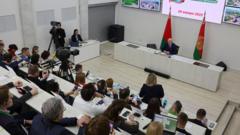Belarusian President Alexander Lukashenko, often referred to as "Europe's last dictator," recently defended the integrity of his country's elections in a live press conference broadcast while voters were still at the polls. The long-standing leader received scrutiny from BBC correspondent Steve Rosenberg, who questioned him about the absence of main opposition rivals, many of whom are currently incarcerated or living in exile.
Lukashenko dismissed concerns over electoral fairness, sarcastically remarking, “What wretched question have you prepared for me?” when pressed about the criticisms of his rule. He maintained that the choice of his rivals to either face imprisonment or seek exile was a personal decision, and not the fault of his government. “Everyone has the right to choose. That is democracy. Some chose prison, others chose exile,” he stated adamantly.
However, this perspective overlooks the series of crackdowns on dissent following the 2020 presidential election, which saw a significant number of opposition figures jailed and political freedoms severely restricted. Rosenberg referenced the harsh realities of over 1,200 political prisoners currently held in Belarusian jails, pressing Lukashenko on the pressing need for their release.
In response, Lukashenko insisted, “Prison is for people who have opened their mouths too wide and who have broken the law,” further challenging the international community’s criticisms by equating Belarusian legal practices to those found in other nations. “You need to abide by the law,” he emphasized, attempting to justify the repressive measures employed by his administration.
Despite Lukashenko's attempts to portray a façade of a democratic process, the election showcased limited real competition, as all available candidates were aligned to varying degrees with his leadership. Critics within the European Union have condemned the election as a “blatant affront to democracy.” Lukashenko, however, remains unperturbed by external judgment, declaring, “I couldn't care less whether you recognise our election or whether you don't. The most important thing for me is that the people of Belarus recognise it.”
As the international community watches closely, the future of democratic practices in Belarus hangs in the balance, with Lukashenko's authoritarian grip seemingly as tight as ever.


















